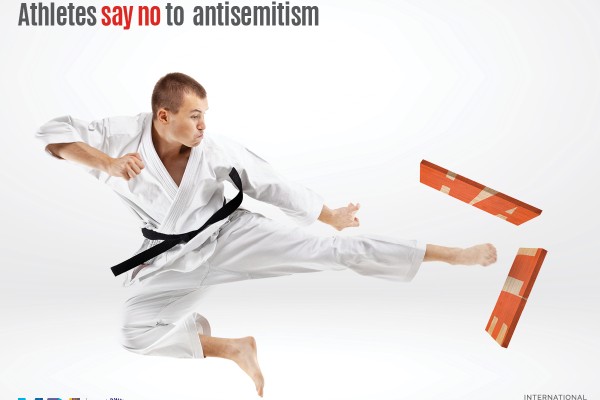“Athletes Say No to Antisemitism” looks to capitalize on Olympics to fight Jew-hatred.
By United With Israel Staff
Aiming to impress people with the importance of fighting hatred, Jewish activists launched “Athletes Say No to Antisemitism” to coincide with the Olympics.
The campaign will encourage leading athletes to take public stands against anti-Semitism, racism and other forms of hate.
Organized by the Maccabiah, Maccabi World Union and the International March of the Living, the initiative will be branded on social media with the hashtags #AthletesAgainstAntisemitism and #NeverMeansNever.
Incidents of anti-Semitism exploded in 2021 following the Gaza crisis of May. Anti-Semitism watchdogs in the U.S., Canada and Britain all reported a sharp rise in assaults, harassment and vandalism. Anti-Semitic rhetoric on social media has also risen to worrying levels.
“Anti-Semitism, like all racism, is contrary to the spirit of sport and has no place in sport. Athletes can and should also serve as role models for how we accept one another and look for what unites rather than divides us,” said Arik Ze’evi, a former judoka and chairman of the 21st Maccabiah games.
“Everywhere I went in our sport, I was always proud of my Judaism and never encountered discrimination. This is the spirit of judo, this is the spirit of sport, and this is the human spirit.”
Antisemitism is breaking records. Take a stand against this dangerous threat together with athletes all around the world! Share & learn more at https://t.co/bmtWrw0smR#Tokyo2020#NeverMeansNever#AthletesSayNoToAntisemitism#Olympics2020#Olympics2021 pic.twitter.com/jstcEauMWm
— March of the Living (@MOTLorg) July 22, 2021
Athletes have leveraged their fame and social media followings to speak out on various social justice issues. In 2020, basketball legend Kareem Abdul Jabbar blasted anti-Semitism in the Black Lives Matter movement. When American football player DeSean Jackson posted a quote attributed to Adolf Hitler, he was called onto the carpet by other Jewish football players like Julian Edelman.
There are hopeful signs at the higher level of sports. In January, the English Football Association, the governing body of British soccer, adopted the International Holocaust Remembrance Alliance’s definition of anti-Semitism. FA officials said they were looking to ensure consistency in defining anti-Semitic conduct or comments.
And after 49 years, the Olympics finally honored Israeli requests for a moment of silence in memory of the 11 athletes killed by Palestinian terrorists at the 1972 Munich games.
But there’s still a ways to go.
David Maimaron, a Massachusetts high school football coach, was fired in March after it was discovered he named certain plays “Auschwitz,” “Hitler” and “Holocaust.” Belgian soccer player Noa Lang has been the center of controversy for anti-Semitic chants and social media posts. Iranian athletes are well-known for refusing to face Israeli opponents.
Unfortunately, the Olympic games are not without blemish.
Algerian judoka Fethi Nourine has already dropped out of the games rather than face Israeli Tohar Butbul in the under-73 kg weight class.
The Tokyo games, delayed by the Covid pandemic, begin on Friday.
MAKE THE LAND OF ISRAEL EVEN MORE BEAUTIFUL!
PLANT YOUR VERY OWN FRUIT TREES IN ISRAEL!
Farmers near the Gaza border lost family, friends and workers. Spring is here, and they desperately need help to replant the farms. Join us in blessing the People and Land of Israel.
“I will ordain My blessing for you…” (Leviticus 25:4)
